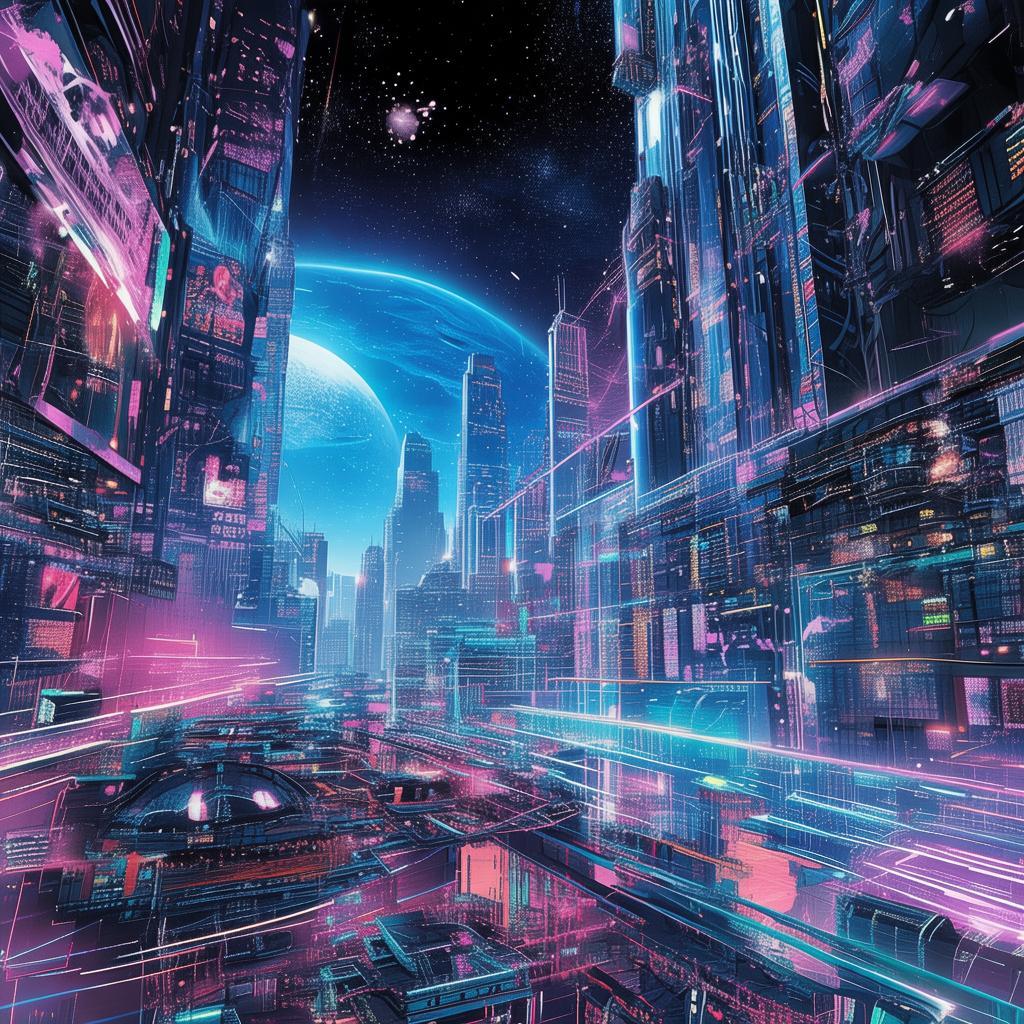The Quantum Enigma: The Sci-Fi Converter's Dilemma
In the year 2147, humanity had reached a new peak of technological advancement. The Quantum Enigma Corporation had developed a groundbreaking device, the Sci-Fi Converter, capable of manipulating the fabric of reality. The converter was designed to transpose fiction into reality, but with this power came a host of moral dilemmas and the potential to unravel the very fabric of time.
The story revolves around a young engineer named Aiden, whose life had been defined by his father's legacy at Quantum Enigma. Aiden had grown up surrounded by the corporation's cutting-edge technology, but he had always been more interested in the science behind the converter than in the potential for profit.
One day, Aiden's boss, Dr. Evelyn Carter, presented him with an opportunity he could not refuse. The corporation was about to unveil a new project, the first ever public conversion—a novel written by a famous author that had never been translated into English. Dr. Carter challenged Aiden to become the first human to convert the story into reality, a task that could earn him fame and fortune.
Excited by the prospect, Aiden began his work, but as he delved deeper into the text, he realized that the story was riddled with paradoxes and inconsistencies. He soon discovered that the novel was not just any work of fiction; it was a cautionary tale about the dangers of tampering with time and reality.
As Aiden worked, the lines between fiction and reality began to blur. Characters from the novel started to appear in his life, and he found himself making choices that seemed to affect the course of history. His first encounter was with a young woman named Clara, who claimed to be from the future. Clara warned Aiden that the novel's conversion could lead to a time paradox, threatening to destroy the entire universe.
Aiden was torn. He wanted to succeed, to be the first person to convert a work of fiction into reality, but he couldn't ignore the moral implications of his actions. He sought counsel from his mentor, Dr. Carter, who had been part of the converter's development.
Dr. Carter, however, had a different perspective. She believed that the converter was a gift to humanity, a way to explore possibilities and expand the bounds of human experience. She argued that the potential risks were worth the reward, and that Aiden's hesitation was due to his own insecurities.
As Aiden continued his work, the paradoxes grew more complex. He found himself making decisions that seemed to affect the very essence of his reality. One night, he awoke to find Clara standing by his bed, her face pale and strained.
"Time is unraveling," Clara whispered. "The paradoxes are becoming impossible to resolve."
Aiden knew he had to act. He had to find a way to prevent the conversion from causing a time paradox. But how? He delved deeper into the novel, searching for a solution.
In a pivotal moment, Aiden realized that the key to preventing the paradox lay in understanding the nature of the converter itself. He discovered that the converter was not just a machine; it was a tool that reflected the user's intentions and fears. The more Aiden feared the consequences, the more likely the paradox was to occur.
Determined to save the universe, Aiden made a bold decision. He would convert the novel in a way that would negate the paradoxes, even if it meant altering history. He set to work, his mind racing with the implications of his actions.
As he completed the conversion, the world around him began to shift. The characters from the novel vanished, and the paradoxes resolved themselves. The universe was safe, but at a cost.
Aiden found himself in a world that was no longer his own. The people he knew were gone, and the technological marvels of the future were replaced with a simpler, more primitive era. He was alone, with no memory of who he was or how he had ended up here.
Then, he saw Clara. She approached him, her eyes filled with sorrow.

"I knew you would do it," she said. "But you cannot change the past."
Aiden looked around at the world that had been altered by his actions. He realized that the real paradox was not in the conversion itself, but in the moral choices he had to make along the way.
In the end, Aiden had to come to terms with the fact that the power of the Sci-Fi Converter was not just a gift, but a responsibility. He had learned that the true test of a person is not in the power they wield, but in how they choose to use it.
The Quantum Enigma: The Sci-Fi Converter's Dilemma was a story of choices, consequences, and the delicate balance between fiction and reality. It left readers pondering the ethical implications of technology and the power of human will to shape the future.
✨ Original Statement ✨
All articles published on this website (including but not limited to text, images, videos, and other content) are original or authorized for reposting and are protected by relevant laws. Without the explicit written permission of this website, no individual or organization may copy, modify, repost, or use the content for commercial purposes.
If you need to quote or cooperate, please contact this site for authorization. We reserve the right to pursue legal responsibility for any unauthorized use.
Hereby declared.









